Jigsaw puzzles from Japan
Traditional painting themes
Some traditional themes - there is much overlap with the "Lucky!" page, as these are invariably chosen to be auspicious. Mount Fuji is an obvious topic - it's a handsome mountain, and is invariably shown in red, a depiction of a phenomenon said to occur once a year or less, in which the whole mountain glows pink at dawn. Then we have the gamut of nature represented by various plants and animals.
On this page: Red Mt Fuji - Flowers and birds - Carp - Buddhist figures
Red Mt Fuji
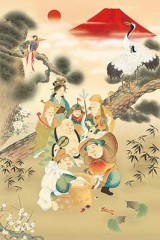 © Ukai Yuhei 1000: Seven gods and seven wishes (Yuhei)The seven gods gather in a group with all the usual lucky emblems around them — red Mt Fuji, cranes, turtles, and so on. The rather jolly two in front are Daikokuten and Ebisu, who are somehow producing money by pounding the glutinous mochi rice which is traditionally always prepared this way. No biographical information is to be found on the artist Ukai Yuhei, another of the craft producers of traditional images particularly for kakemono scrolls. He signs his work the traditional way, with his given name Yuhei, and a seal of the same.  Not available Not availableDiscontinued February 2025 An Appleone puzzle: 1000 pieces; 500 x 750 mm (20" x 30") Code: A10679 (1000-679 on package) Retail price ¥3000 |
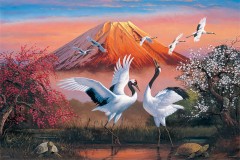 © Tatsuji Kajita 1000: Mount Fuji cranes (Kajita)A faithful pair of cranes, but the others flying by make an auspicious total of seven. Red Mt. Fuji in the background, together with red and white plum blossoms and a couple of turtles, complete this very traditional painting, in Kajita's distinct and vibrant style. Born in Nagoya in 1936, the artist became a successful illustrator of books, and commercial articles. In the late 1980s, he embarked on a second career, in oil painting, with which he has had many personal exhibitions. He paints a wide range of subjects, signing the more traditional pictures with the characters for his given name, Tatsuji, together with a seal, whereas on the illustration-style paintings of trains and sailing ships he signs "T. Kajita" in the western style.  In stock In stockA Yanoman puzzle: 1000 pieces; 750 x 500 mm (30" x 20") Code: Y101319 (10-1319 on package) Retail price ¥3000 (approx. US$20.69 €19.11 £16.04) All about ordering (please read first)
|
- See also: Fuji in photos
Flowers and birds
The auspicious crane, the showy peacock, the humble chicken - this common style portrays birds surrounded by suggestions of their natural habitat...
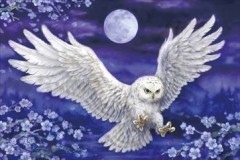 © Harai Kayomi / Studio Oz 1000: Cherry blossom owl (Kayomi)A simple but effective composition: the owl approaches us ready to pounce. The cherry blossom lit only by the full moon has an eerie tone, which will make the puzzle interesting but quite a challenge. No biographical details available. She signs her given name Kayomi in Roman letters.  In stock In stockAn Epoch puzzle: 1000 pieces; 750 x 500 mm (30" x 20") Code: E11511 (11-511 on package) Retail price ¥3000 (approx. US$20.69 €19.11 £16.04) All about ordering (please read first)
|
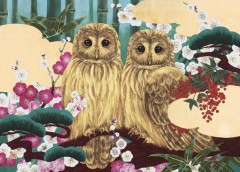 © Toyama Hiroko 500: Golden owls (Toyama)A serene pair of owls gaze out from a typically stylised background from this artist; including the traditionally fortunate combination of pine, bamboo, and plum. Born in Miyagi, northern Japan in 1984, Toyama Hiroko (Toyama is her family name) specialises in birds and flowers, bringing a modern touch along with many traditional stylisations.  In stock In stockAn Epoch puzzle: 500 pieces; 530 x 380 mm (21" x 15") Code: E06082 (06-082 on package) Retail price ¥2000 (approx. US$13.79 €12.74 £10.70) All about ordering (please read first)
|
Carp
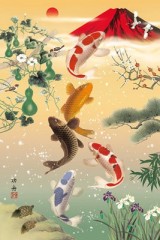 © Seta Koshu 1000: Five jumping carp (Seta)Five colourful carp are surrounded by other auspicious symbols, from turtles at the bottom to Mount Fuji at the top. 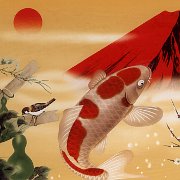 Few details of the artist Seta Koshu are available: he entered the world of Japanese art through a family pottery business, but his skill with the brush was evident, and he is a skilled producer of kakemono scrolls. Seta is his family name.  In stock In stockAn Appleone puzzle: 1000 pieces; 500 x 750 mm (20" x 30") Code: A10666 (1000-666 on package) Retail price ¥3000 (approx. US$20.69 €19.11 £16.04) All about ordering (please read first)
|
Buddhist figures
The panoply of deities of various ranks from the Buddhist traditions...
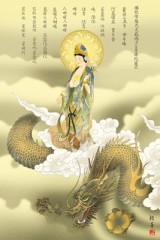 © Hojo Yuka / Sankoh 1000: Kannon rides the DragonA very matronly Kannon, the Goddess of Mercy, stands barefoot amidships on a rather nice dragon. In her left hand she holds a flower (perhaps a lotus flower), while the dragon similarly clutches the symbolic Chintamani Stone (or "treasure ball"). This is a standard pose for Kannon, and this version is subdued in tone yet full of details. The image also includes a complete sutra for the elimination of disasters — this is essentially in Sanskrit transliterated into ancient Chinese, so a typical Japanese reader can make no more meaning of it than you can. Although Kannon is often known as "Goddess of Mercy", experts in Buddhism tell us she is really Avalokitêsvara, who was a man...  In stock In stockAn Appleone puzzle: 1000 pieces; 500 x 750 mm (20" x 30") Code: A10676 (1000-676 on package) Retail price ¥3000 (approx. US$20.69 €19.11 £16.04) All about ordering (please read first)
|
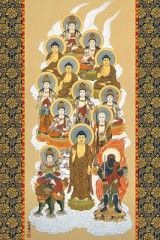 © Takeda Koun 1000: Thirteen BuddhasThe thirteen Buddhas are a Japanese grouping of deities, traditionally seen as serving a protecting role. Although they are all quite distinct (their names are listed on the box), many of the portrayals are very similar — but notice each has a different mudra, or gesture. Wikipedia has a complete list of the Thirteen Buddhas (in the same order as the key on the puzzle box)  In stock In stockAn Appleone puzzle: 1000 pieces; 500 x 750 mm (20" x 30") Code: A10652 (1000-652 on package) Retail price ¥3000 (approx. US$20.69 €19.11 £16.04) All about ordering (please read first)
|
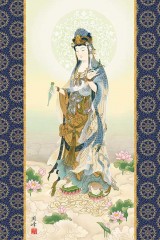 © Takatomi Shūhō 1000: Lotus KannonA classic pose of Kannon, the Goddess of Mercy, is to stand on a lotus blossom, but here she has each bare foot on a separate flower, posing a tricky balance problem. In her hand she holds a vial of sacred water, with eight beneficent properties to heal all ills. Although Kannon is normally portrayed as female, experts in Buddhism tell us she is really Avalokitêsvara, who was a man... The painting is in the form of a kakejiku, a hanging scroll with an abstract pattern down each side. The artist's name is signed 周峰 (Shūhō), but there are no other details.  In stock In stockAn Appleone puzzle: 1000 pieces; 500 x 750 mm (20" x 30") Code: A10850 (1000-850 on package) Retail price ¥3000 (approx. US$20.69 €19.11 £16.04) All about ordering (please read first)
|
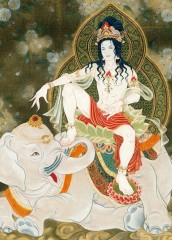 © Kimura Ryoko 500: Samantabhadra (Ryoko)Samantabhadra is the Sanskit name of the bodhisattva known in Japan as Fugen. Here he is, unusually, portrayed alone, but as is traditional, seated on an elephant with six tusks. Born in 1971, Ryoko Kimura graduated from Tokyo University of the Arts in 1997, with a specialisation in mural painting. Her style embodies traditional techniques, while her speciality, portrayal of the male form, adds tinges ranging from the comic to the erotic.  In stock In stockAn Epoch puzzle: 500 pieces; 380 x 530 mm (15" x 21") Code: E06122 (06-122 on package) Retail price ¥2000 (approx. US$13.79 €12.74 £10.70) All about ordering (please read first)
|

